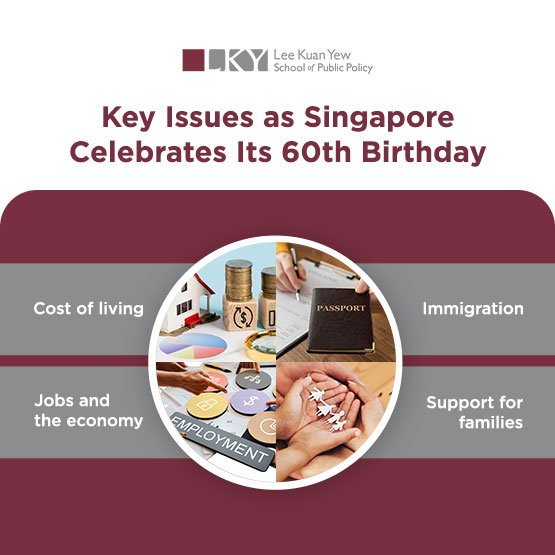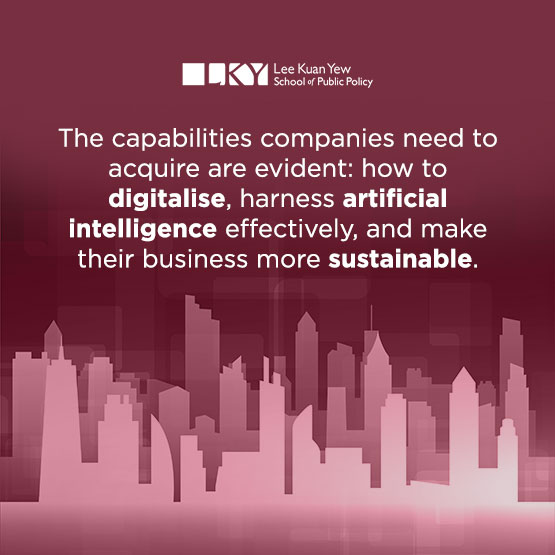The year that has ended - 2024 - was a momentous one for Singapore. The nation saw a new prime minister sworn in and witnessed groundbreaking policy and legislative moves that have redefined the labour policy landscape.

But it is the year that we have ushered in - 2025 - that could prove to be the game changer. It is a year that marks SG60 - Singapore's 60th birthday. It is also a year in which Singapore goes to the polls.
The general election, which Prime Minister Lawrence Wong and the 4G leadership at the helm, will be a watershed one. Much rides on the outcome of this election, which could set the direction and tone for the nation for the next five years and beyond.
The election will undoubtedly see hot-button issues like the cost of living and immigration intensely debated. Hopefully, there will be as much attention on the longer-term vision for Singapore, particularly policies to take Singapore further in the direction of a more inclusive society.
Cost of living
Expectations are high for Budget 2025 to address the cost of living. While inflation has receded from the post-pandemic highs of 2021-22, prices for many goods and services are now significantly higher than they were a few years ago.
PM Wong noted in his speech at the People's Action Party Convention that, around the world, frustration with the cost of living had resulted in governing parties losing vote share in elections held in 2024.
The Government has not waited for the Budget to roll out support. A property tax rebate for 2025 has already been announced. National Service LifeSG credits have been disbursed, while adult Singaporeans have also received cash payouts under the Assurance Package in December. Further support is likely forthcoming in Budget 2025, with its size dependent on Singapore's fiscal position before the current term of government ends.
These measures, while welcome by households, are however not a long-term solution for the cost of living. As a small open economy, Singapore is a price-taker in the global market for commodities such as food, energy, and raw materials. While the cost of imports can be managed to an extent by maintaining a strong Singapore dollar, the cost of living will always be high in an affluent, cosmopolitan city with purchasing power driving strong demand.
The principal means by which the Government has tried to address this is by helping Singaporeans earn good incomes through public investment in education, skills and job creation. This must continue to be prioritised. In parallel, there is a need to strengthen social support to give citizens assurance in a competitive, fast-changing economy with a high cost of living.
Permanent social transfers such as the Workfare Income Supplement and GST Voucher will have to be strengthened or extended to more Singaporeans, and the Government may have to find new ways of doing so without eroding the work ethic.
Support should also be targeted at specific segments of the population that may require greater help. Budget 2025 is expected to provide details of the Large Families Support Scheme, which PM Wong announced at the 2024 National Day Rally. This will alleviate the cost of living for families with three or more young children, and those planning to have a third child. Asset-rich but cash-poor households, such as retirees living in private property, could also benefit from more support.
A holistic approach to addressing the cost of living would also entail managing supply and demand for key expenditure items. For instance, the Government can influence housing prices through the supply of residential land and housing units as well as through property colling measures to manage demand.
Competition law must also be enforced rigorously to ensure that markets function efficiently. This includes reining in anti-competitive practices that could drive up consumer prices, as well as scrutinising potential mergers and acquisitions that could result in excessive market dominance.
It is important to ensure that public has a choice of lower-cost options across a range of goods and services. These could include supermarket house-brand products, affordable hawker food, smaller housing units, and no-frills public amenities. There may even be scope to lower the cost of public services through greater productivity, efficiency and innovation.
Finally, financial education is vital to help citizens manage their finances prudently and grow their savings, so as to increase household resilience to rising prices.
The economy and jobs
PM Wong has already indicated that the economy and jobs will be in focus in the coming Budget. There will likely be more support for business transformation - to acquire new capabilities to remain competitive, to expand and penetrate new markets, and to develop human capital.
The capabilities companies need to acquire are evident: how to digitalise, harness artificial intelligence effectively, and make their business more sustainable. The key at this juncture is how to translate Singapore's considerable investment in infrastructure and R&D expertise into solutions that will raise the game of our companies, both large and small. Budget measures that will bridge the last mile will be particularly welcome by small and medium-sized enterprises.

In the end, what matters to businesses is whether the schemes and funding are accessible to them and whether the support moves the needle for their productivity and profitability. System integrators and business-to-business service providers could play a useful role. Firms should be encouraged to experiment and innovate; some "creative destruction" is to be expected in this age of rapid technological change.
Meanwhile, several new policies that will affect businesses already kicked in on Jan 1. Platform companies will look at the impact of the Platform Workers Act that provides more protection for platform workers, but would also raise costs for companies. Multinational enterprises will be subject to new income tax measures under the Base Erosion and Profit Shifting (BEPS) 2.0 initiative.
Employers are also braced for the Workplace Fairness Bill, which was tabled in Parliament in November and will provide legal safeguards against discriminatory employment practices.
As for workers, they can take advantage of the new SkillsFuture Level-Up Programme for mid-career Singaporeans to invest in substantial skills upgrading. It would be useful now to focus on how the skills that workers acquire can help them boost career health and resilience.
More support for families
Notwithstanding all that has been done to encourage family formation, from cash incentives and enhanced childcare subsidies to longer paternity leave, Singapore has no alternative but to redouble its efforts on all fronts, given the record-low fertility rate.
The aforementioned Large Families Support Scheme could help by alleviating the cost pressures on families with more children. Babies born in 2025 will receive a special SG60 gift. Hopefully, 2025 will see an uptick in births just as 2015 did.
With many adult Singaporeans part of the "sandwiched generation" taking care of ailing parents and young children simultaneously, the risk of caregiver burnout is real. In particular, many more are becoming caregivers for elderly family members as the population ages and the prevalence of dementia rises.
Support for caregivers could go some way in easing their burden. This could include making available more respite or daycare services, or expanding the Household Services Scheme that allows migrant workers to provide part-time domestic services, including care for seniors.
Enhanced subsidies for these services or tax reliefs for those performing caregiving roles would also be welcome.
While awareness of mental health issues has grown, this could be further reinforced by efforts to expand the range and accessibility of mental health support, as well as raise service standards, through grants and capability building.
The ComLink+ Progress Packages that provide financial and social support to lower-income families are being progressively rolled out, beginning with the Pre-school Package to encourage parents to send their children to pre-school regularly.
The other three Progress Packages - focused on home ownership, employment and debt clearance - followed suit from the end of 2024. An evaluation of outcomes in due course could help inform future progress packages.
In September 2024, the Taskforce on Promoting Inclusive Employment Practices, under the Enabling Masterplan 2030, set out its recommendations to expand employment opportunities. These included growing the pool of inclusive employers, expanding employment opportunities for persons with disabilities and better equipping job coaches to support them. A key priority would be to ensure continuity of support for youth with disabilities transiting from the school system into the workforce.
The upcoming Budget and Committee of Supply Debate could see some of these recommendations fleshed out into concrete policies and programmes for a more inclusive society.
Following his maiden National Day Rally in August 2024, Budget 2025 is the next opportunity for PM Wong to set the agenda for his Government and communicate his vision for Singapore to the public ahead of the general election.
Although the contours of this agenda have already been set out in the Forward Singapore report, there could still be surprises in the offing, even the slaying of some "sacred cows". One need not look far back for inspiration. Not long after former PM Lee Hsien Loong had taken office in 2004, he introduced a five-day workweek, beginning with the civil service. While some would no doubt hope that PM Wong will follow suit by announcing a four-day workweek, I wouldn't hold my breath.
This article was first published in The Straits Times on 2 January 2025.